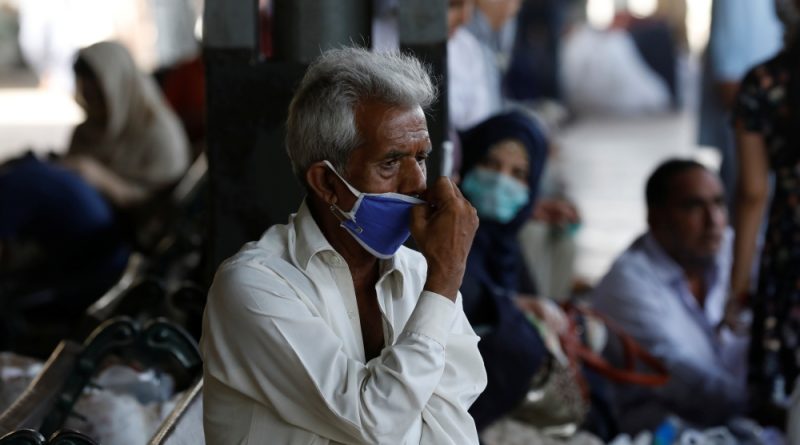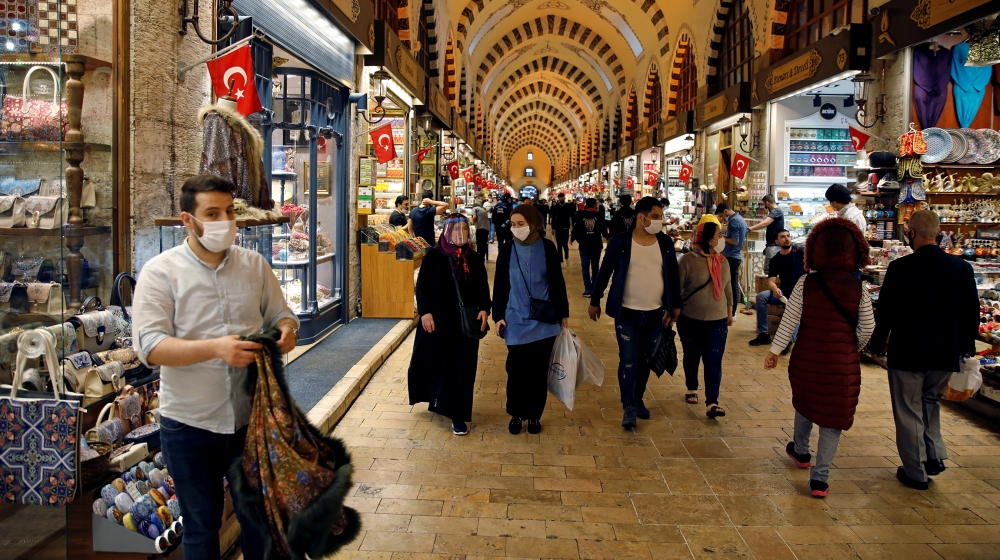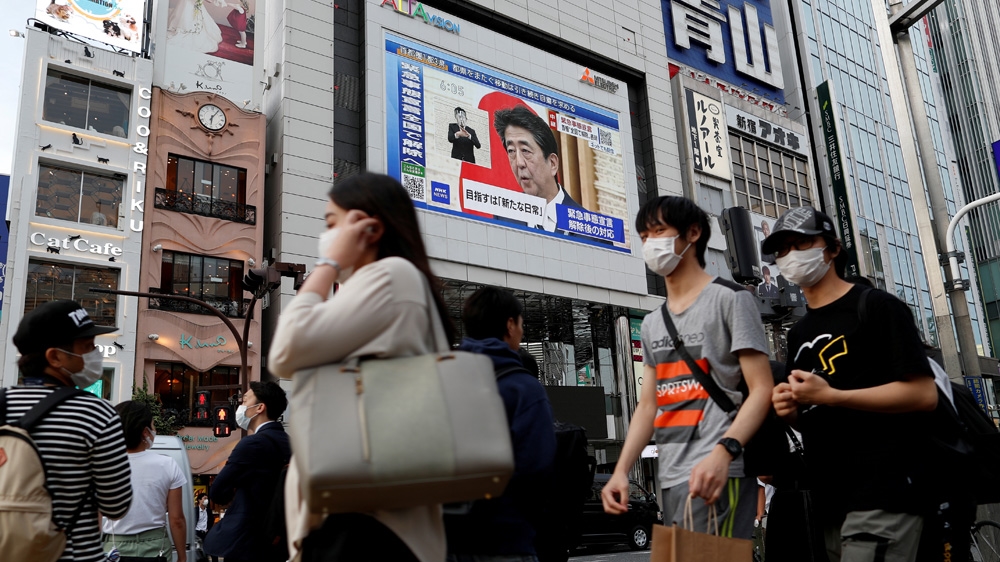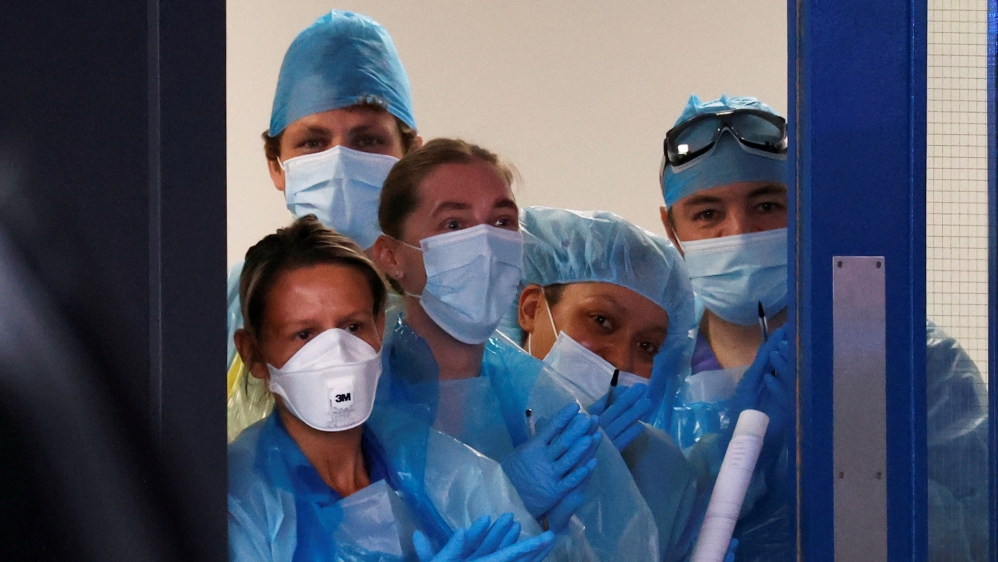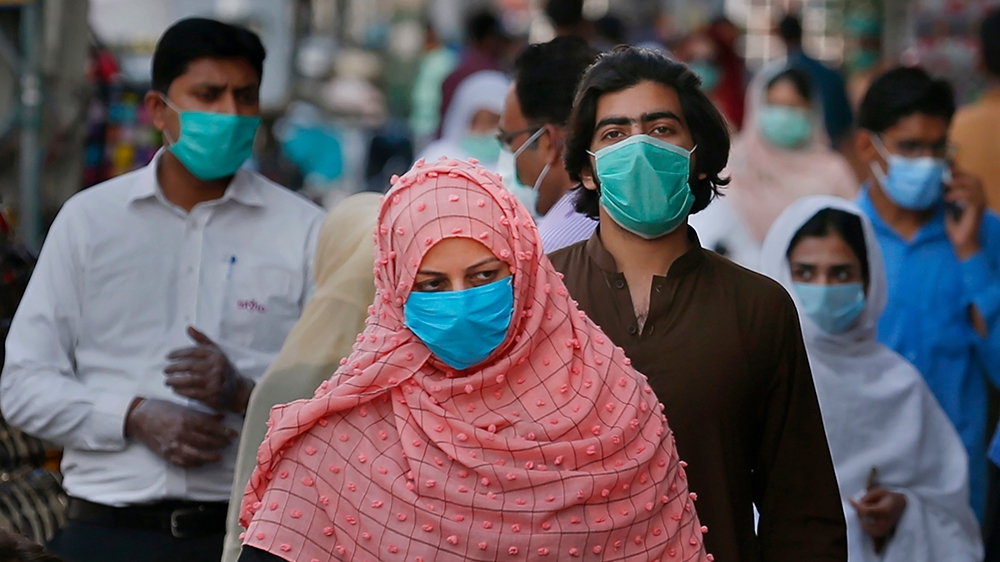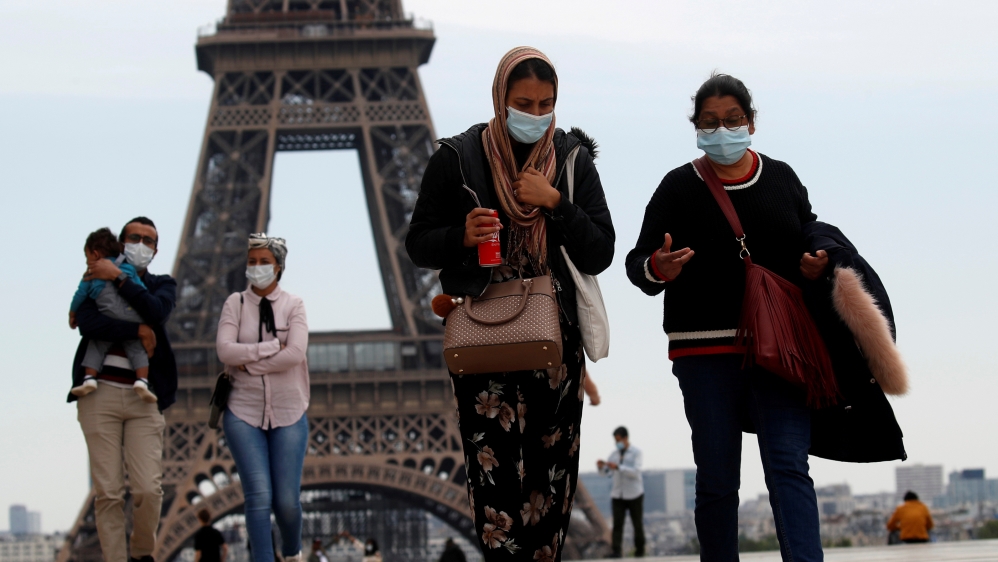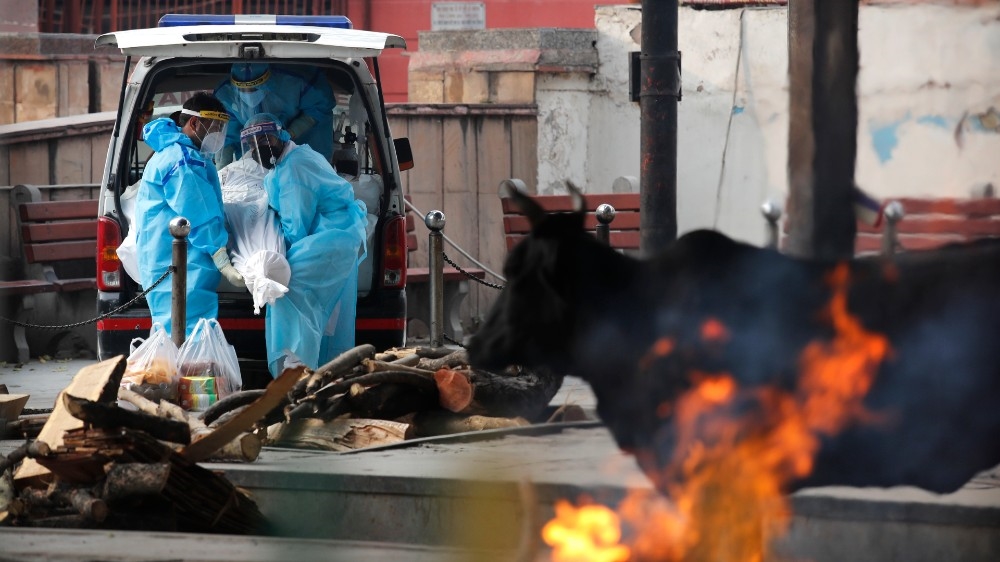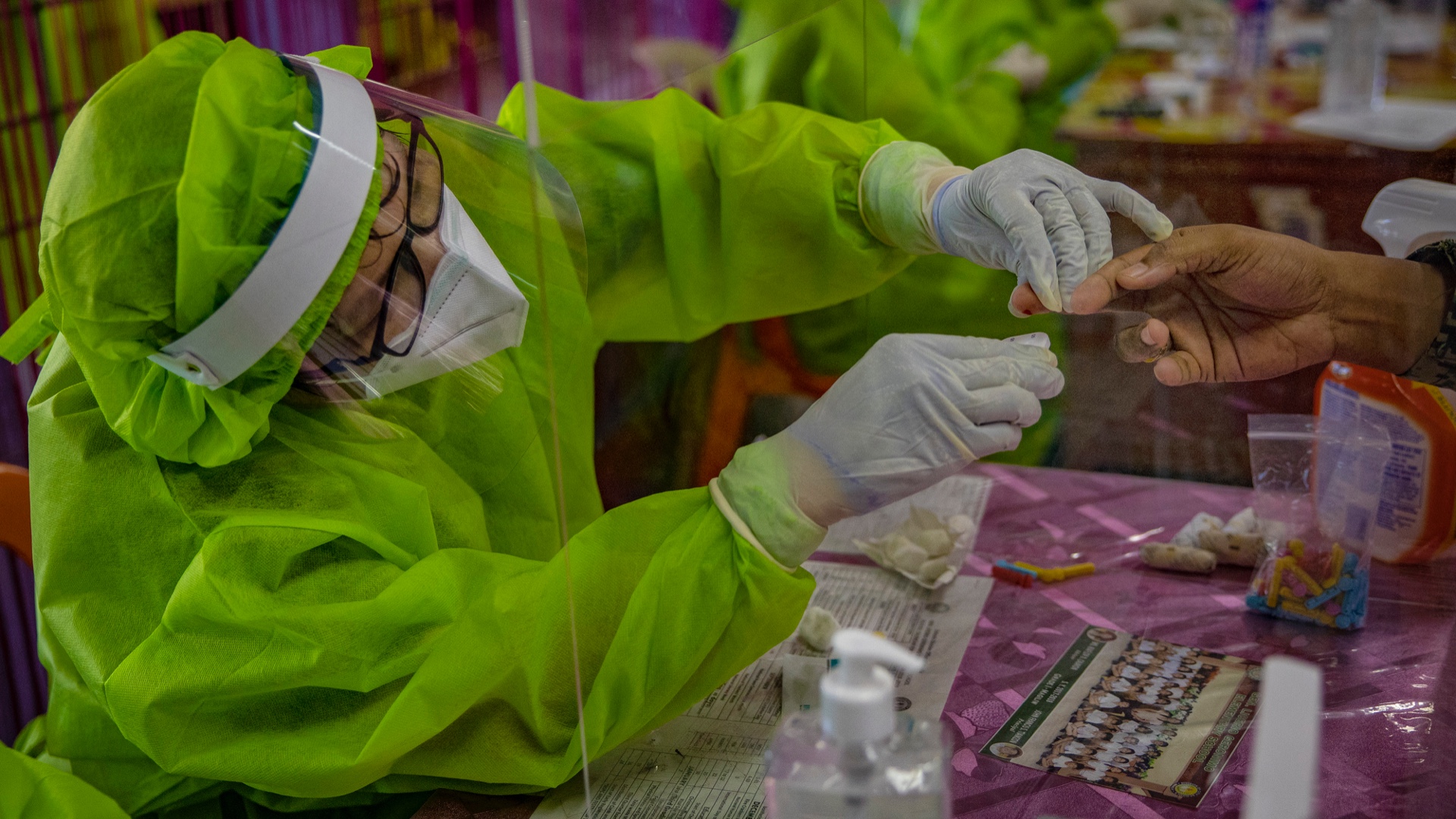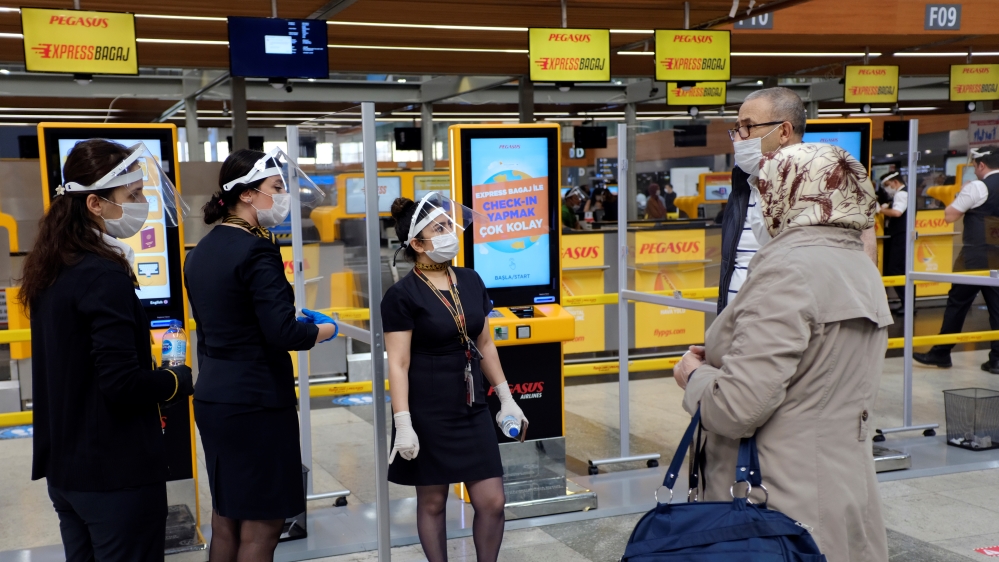Pakistan PM warns of more coronavirus deaths: Live updates | News
-
-
Beijing reported its first instance of a local transmission in weeks – a 52-year-old man who said he had not left the Chinese capital for more than two weeks and had not been in contact with anyone from outside the city.
-
-
-
A vaccine against COVID-19 developed by United States biotech firm Moderna will enter the third and final stage of its clinical trial in July with 30,000 participants, the manufacturer has announced.
-
-
- Neil Ferguson, an epidemiologist at Imperial College London, whose modelling helped set the United Kingdom’s coronavirus strategy, says the country’s death toll could have been halved if lockdown had been introduced a week earlier. The UK has more than 291,000 cases and at least 41,000 deaths.
-
- More than 7.48 million people have now been confirmed to have the coronavirus and at least 420,000 have died, according to data from Johns Hopkins University.
Here are the latest updates:
Friday, June 12
15:15 GMT – Turkish medical association: Coronavirus lockdown eased too soon
Turkey’s top medical association criticised the decision to ease restrictions imposed to combat the spread of the coronavirus, saying moves were not backed by science and had come too soon, before the country had overcome the pandemic’s initial wave.
Cavit Isik Yavuz, a member of the coronavirus research team at the Turkish Medics Association’s (TTB), said there was still no proof that the outbreak was under control, and warned the lifting restrictions was resulting in more infections.
Since June 1, Turkey has lifted weekend stay-home orders, ended curbs on intercity travel, resumed some international flights and re-opened cafes, restaurants, parks, beaches and gyms. Nearly 4,800 have died of COVID-19 so far in Turkey, according to official data, with the daily death toll falling in recent weeks to about 20.
15:00 GMT – Norway shuns Sweden in lifting travel restrictions
Norway will allow travel to and from Finland, Iceland and the Swedish island of Gotland from Monday, but will maintain travel restrictions on mainland Sweden due to its higher level of COVID-19 cases.
Denmark, Finland and Norway have lifted some of the controls on leisure travel they imposed to slow the coronavirus pandemic, but they have kept most of those imposed on Sweden, the most populous of the Nordic countries.
Leaving most of Sweden out of the arrangements breaks with long-standing close cooperation between the Nordic countries, and goes against the wishes of the European Commission, which wants to lift by Monday the internal borders in the Schengen travel area, which in normal times has no borders.
14:30 GMT – Japan aims to launch coronavirus tracking app next week
Japan aims to launch a smartphone app based on technology from Apple Inc and Alphabet Inc’s Google next week to help curb the spread of coronavirus by tracking close contact with those infected, the health ministry said.
Smartphones with the app installed can detect each other via Bluetooth short-range wireless and log those who have come in close contact.
If a phone user is found to be infected, people who spent more than 15 minutes within a radius of one metre of that individual sometime over the previous 14 days will be notified that they were in close contact with a coronavirus-infected person, and be prompted to seek medical consultation.
Such a message will be sent only if the infected individual gives consent, and the person with a positive diagnosis will remain anonymous to the receivers of the notification.
13:50 GMT – Ukraine president’s wife tests positive for coronavirus
Olena, the wife of Ukrainian President Volodymyr Zelenskiy, said she had tested positive for coronavirus but her husband and their two children had tested negative.
“Today I received a positive test for coronavirus. Unexpected news. Especially considering that I and my family continue to follow all the rules – masks, gloves, a minimum of contacts,” Zelenska wrote on Facebook. She said she felt well, was not hospitalised, but was isolating from her husband and children.
Ukraine has reported 29,753 coronavirus cases, including 870 deaths.
Hello, this is Umut Uras in Doha taking over from my colleague Shereena Qazi.
12:40 GMT – Quarantine rules are to protect public health: UK PM’s spokesman
UK’s government brought in quarantine rules to protect public health, a spokesman for Prime Minister Boris Johnson said, declining to comment on legal action brought by British Airways, easyJet and Ryanair.
“I would emphasise that we’ve obviously brought these quarantine rules into place to protect public health and ensure we don’t import the virus as cases in the community reduce,” the spokesman told reporters, adding that the government does not comment on “ongoing legal matters”.
12:25 GMT – Asymptomatic COVID-19: Five things to know
Since the first cluster of cases of the novel coronavirus was reported in China last December, scientists have been racing to get a better understanding of the highly contagious disease, COVID-19, and how to stop its spread.
The coronavirus is transmitted from person to person through direct contact, droplets of saliva while coughing or discharge from the nose when sneezing.
But there is ongoing scientific debate and research concerning the contagion passing on from asymptomatic carriers.
What is asymptomatic? Find out here.
12:15 GMT – Wife of Ukraine president tests positive for COVID-19
Olena, the wife of Ukrainian President Volodymyr Zelenskiy, said on Friday she had tested positive for coronavirus but her husband and their two children had tested negative.
“Today I received a positive test for coronavirus. Unexpected news. Especially considering that I and my family continue to follow all the rules – masks, gloves, a minimum of contacts,” Zelenska wrote on Facebook.
12:05 GMT – Pakistan hospitals struggle as coronavirus cases explode
From our correspondent Asad Hashim in Islamabad, Pakistan – Atiqullah did not know what else to do. He spent three days scouring the northwestern Pakistani city of Peshawar for a ventilator for his 60-year-old father, who had tested positive for the coronavirus and was in a critical condition.
“The doctors were trying their best but we couldn’t find a bed in the Intensive Care Unit [ICU],” he told Al Jazeera. “For three days we were trying to get him shifted into an ICU because he was in such a serious condition.”
Ultimately, he found a bed in an isolation ward at the Lady Reading Hospital – the city’s largest government hospital – but there was still no ventilator available.
Read the full story here.
11:45 GMT – EU’s health chief warns COVID-19 health crisis not over yet
The public health crisis caused by COVID-19 in Europe is not over yet, the European Union’s top health official warned, urging governments to remain vigilant and plough ahead with testing and tracing the population.
“This is not behind us yet. We need to be vigilant,” EU Health Commissioner Stella Kyriakides told EU health ministers in a videoconference, amid fears of a new surge in infections as EU states gradually reopen business and borders and after mass protests in recent days across the continent.
11:20 GMT – Qatar records 1,517 new cases
Qatar’s health ministry recorded 1,517 news cases, taking the total number of infections in the country to 76,588.
One person died from the virus, bringing the total death toll to 70, according to the ministry.
The Ministry of Public Health announces 1,517 confirmed new cases of coronavirus, and 1,965 recovered cases in the last 24 hours, bringing the total number of recovered cases in Qatar to 53,296 cases, in addition to recording 1 new death. #QNA pic.twitter.com/bAuwERttnj
— Qatar News Agency (@QNAEnglish) June 12, 2020
11:02 GMT – Germany well-placed to avoid second wave of COVID-19 infections: Minister
Germany is well placed to avoid a second wave of coronavirus infections, Finance Minister Olaf Scholz said on Friday, warning that the absence of a vaccine meant social distancing as well as testing and tracing measures were necessary.
“We are living with the virus, which I describe as a new normal. And it will only change when we have new medical therapies and when we have a vaccine,” Scholz said. “As long as this is not the case, we have to organise our lives so as to avoid a second wave.”
He added that the chances were “very, very large” that Germany could avoid a second wave.
10:40 GMT – Coronavirus patients ‘treated worse than animals’: India court
As deaths caused by the novel coronavirus disease continue to mount, India’s top court has expressed outrage over the way the patients are being handled by the hospitals and authorities.
“COVID-19 patients are [being] treated worse than animals,” said the Supreme Court, as it issued notices to the federal and state governments on the “deplorable condition”, Indian media reports said on Friday.
“In one case, a body was found in the garbage,” said the court. “Patients are dying and nobody is there to even attend to them.”
Read more here.
10:30 GMT – Philippines records more 600 new COVID-19 cases
The Philippines on Friday reported 615 more coronavirus infections, bringing its total number of confirmed cases to 24,787.
In a health ministry bulletin, the Southeast Asian country also recorded 16 additional fatalities related to the novel coronavirus, taking its death toll to 1,052.
The health ministry said three duplicate cases were removed from the total number of infections reported as of June 11.
10:25 GMT – Prosecutors to question Italy’s PM over coronavirus response
Italy’s public prosecutors are set to question Prime Minister Giuseppe Conte, along with Health Minister Roberto Speranza and Interior Minister Luciana Lamorghese, over the government’s response to the coronavirus pandemic.
Friday’s interrogation comes weeks after the investigation was launched on April 8 by the prosecutors from Bergamo, the city in the northern Lombardy region worst hit by the virus that killed more than 34,000 people in the country.
Read more here.
10:10 GMT – Pegasus Airlines to resume international flights
Turkey’s low-cost Pegasus Airlines will resume international flights on Saturday, the company announced.
Pegasus said in a statement that it will operate the first flight to Germany following the temporary suspension of flights as part of the restrictions to combat COVID-19.
Pegasus will be gradually restoring flights between Turkey and several European destinations from June 15.
The company will fly to Germany, Austria, Switzerland, Denmark, England, the Netherlands, France, and Belgium in the first phase.
09:07 GMT – Indonesia reports new COVID-19 cases, deaths
Indonesia reported 1,111 new coronavirus infections and 48 new deaths, taking the total number of cases to 36,406 and fatalities to 2,048, health ministry official Achmad Yurianto said.
Yurianto said 577 more patients had recovered from COVID-19, bringing the total number of recovered cases to 13,213.
Indonesia has tested a total of 302,147 people as of Friday.
09:05 GMT – Aid groups ‘alarmed’ by little US coronavirus assistance
More than two dozen international aid organizations have told the US government they are “increasingly alarmed” that “little to no US humanitarian assistance has reached those on the front lines” of the coronavirus pandemic.
The letter obtained by The Associated Press and signed by groups including Save the Children, Mercy Corps, World Vision and others says that “in spite of months of promising conversations with USAID field staff, few organizations have received an executed award for COVID-19 humanitarian assistance”.
It calls the delays “devastating” and says the window is closing for the US to help mitigate the worst impacts of the pandemic around the world.
08:45 GMT – EU warns COVID-19 crisis not over yet
The public health crisis caused by the COVID-19 epidemic in Europe is not over yet, the European Union’s top health official warned, urging governments to remain vigilant and plough ahead with testing and tracing the population.
“This is not behind us yet. We need to be vigilant,” EU Health Commissioner Stella Kyriakides told EU health ministers in a videoconference, amid fears of a new surge in infections as EU states gradually reopen business and borders and after mass protests in recent days across the continent.
08:25 GMT – Air France accelerates resumption of summer flights
Air France announced it was accelerating moves to resume flights over the summer holiday period.
It said several routes would resume between Paris and the French regions, as well as inter-regional routes, particularly to and from Corsica.
The number of services will also be increased to the French overseas departments and territories, as well as to Europe, mainly to Spain, Greece, Italy and Portugal.
08:20 GMT – India fourth worst-hit nation
India has reported a total of 297,535 coronavirus infections, surpassing the United Kingdom to become the fourth worst-affected country in the world, behind only the United States, Brazil and Russia.
The number of infections increased by 10,956 on Friday from the previous day, and the death toll reached 8,498, India’s ministry of health and family welfare said.
Read more here
07:40 GMT – Pakistani PM warns more deaths of coronavirus
Pakistani Prime Minister Imran Khan has warned citizens that the number of deaths from the coronavirus will continue to rise in the country, as the death toll hit a single day record of 107 on Thursday.
Addressing the nation, Khan continued to rule out imposing any widespread lockdown, as per the World Health Organization’s advice, saying that instead there would be greater monitoring of social distancing and hygiene directives, with businesses that do not comply being shut down.
Pakistan saw 6,397 new cases of the coronavirus on Thursday, taking its total tally to 125,933.
06:45 GMT – Australian clot-busting drug holds hope for COVID-19 treatment
An experimental drug developed by an Australian researcher could help prevent deaths from COVID-19 by controlling the formation of blood clots responsible for breathing difficulties, organ failure, stroke and heart attack.
About three in four of critical COVID-19 patients in ICUs develop clots with their recovery rate critically low, said Professor Shaun Jackson from the University of Sydney and the Heart Research Institute.
Following successful phase-one trials in 72 healthy patients, the researchers now want to urgently move into phase two trials by testing the effectiveness and safety of the drug in critically ill COVID-19 patients.
05:57 GMT – South Korea warns of tougher physical distancing measures
South Korea will extend physical distancing guidelines until daily new infections drop to single digits, the health minister said, failing which he warned of a return to tougher measures.
Park Neung-hoo urged residents of the Seoul metropolitan area to stay home as much as possible as new cases have persisted in the mid-double digits daily, with 56 new cases reported at the end of Thursday. Public facilities, including night life spots, religious establishments, museums, and parks, will remain closed.
Tougher social distancing rules will be considered if 50 daily infections persist for more than two weeks, depending on the number of new outbreak clusters, Park added.
05:31 GMT – Electronics firm PCI to make Singapore’s virus-tracing device
Singapore-based electronics maker PCI has won a bid to supply 300,000 dongles for a government project that could eventually see everyone in the city-state given the wearable device to help identify people who have interacted with COVID-19 carriers.
The $6m Singapore dollar ($4.3m) tender, equivalent to S$20 a unit for the bluetooth-enabled TraceTogether Tokens, was awarded by Singapore’s Government Technology Agency to the firm on May 14, according to a government notice.
The pilot project comes after an earlier smartphone-based contact tracing app had limited take-up as it did not work efficiently on some devices.
Like the app, the token will use Bluetooth signals to record nearby devices but cannot capture location data and does not have internet or cellular connectivity, according to the government, which has pledged to protect user privacy.
05:10 GMT – Maldives to ease lockdown, but no family visits allowed
Health authorities in the Maldives say residents of the capital, Male, will be allowed to leave their homes without permits starting from June 15 as part of a phased easing of its two-month old lockdown.
Domestic airports will open, and restaurants and cafes can resume takeaway and delivery services.
The Health Protection Agency, however, is advising against visiting family members at their homes and is banning gatherings of more than three people in any public spaces.
Masks are mandatory in public spaces, it added. The Indian Ocean island nation has reported eight deaths and 1,976 infections, of which the vast majority were in the congested capital.
04:27 GMT – Morrison ‘pushes for reopening of Australia’s internal borders’
Australia’s federal government stepped up pressure on state and territory leaders on Friday to reopen internal borders, a step viewed as key to reviving the country’s coronavirus-hit economy.
Prime Minister Scott Morrison made the plea at a meeting of the national cabinet dealing with the crisis, Reuters news agency reported, citing two people with knowledge of the meeting.
“State borders should be open,” Finance Minister Mathias Cormann told Sky News on Friday, adding that a second wave of infections could cost the economy A$80bn ($52bn) over the next two years. “Tourism operators in North Queensland would like to be able to draw on tourists in New South Wales.”
03:30 GMT – Beijing reports first locally transmitted case in weeks
China has reported seven new coronavirus cases, including the first instance of local transmission in Beijing in weeks.
Authorities said the other six cases were all brought into the country by Chinese citizens arriving from abroad. No new deaths were reported.
Officials in Beijing say the locally transmitted case involves a 52-year-old man who arrived alone at a clinic displaying an intermittent fever but no other symptoms. He was swiftly diagnosed as having COVID-19, prompting authorities to isolate family members and reinstate anti-virus measures in his neighbourhood.
The man said he had not left Beijing for more than two weeks and had not been in contact with anyone from outside the city.
02:46 GMT – Double lung transplant saves young virus patient
Surgeons in Chicago in the United States have given a new set of lungs to a young woman with severe lung damage from the coronavirus.
Only a few other COVID-19 survivors, in China and Europe, have received lung transplants. The patient, who is in her 20s, was on a ventilator and heart-lung machine for almost two months before her operation at Northwestern Memorial Hospital.
The 10-hour procedure was challenging because the virus had left the patient’s lungs full of holes and almost fused to the chest wall, said Dr Ankit Bharat, who performed the operation.
“This important milestone indicates that, while the transplant procedure in these patients is quite challenging technically, it can be done safely,” he said. “And it offers the terminally ill COVID-19 patients another option for survival.”
“For many days, she was the sickest person in the COVID ICU and possibly the entire hospital.” A woman in her 20s is the first #COVID19 patient to receive a double-lung transplant @NorthwesternMed. Details from the press conference: https://t.co/sl7QkZuKvI. #COVIDLungTransplant pic.twitter.com/orka3YBhzj
— NM Media Relations (@NMHC_News) June 11, 2020
02:27 GMT – Report says UK BAME groups must get targeted health advice
An unpublished United Kingdom government report said that Black, Asian and minority ethnic (BAME) groups in the UK should be given targeted health advice in the event of a second wave of the coronavirus outbreak, according to Sky News.
Earlier this month, a Public Health England report revealed that Black and Asian people in the UK are up to 50 percent more likely to die after being infected with COVID-19.
01:26 GMT – Famed Thai temple bars foreigners entry
One of Thailand’s major tourist attractions is barring entry to foreigners, professing fear that they could spread the coronavirus.
Signs seen Thursday morning at the main gate of Wat Pho, the Buddhist temple adjacent to the Grand Palace in Bangkok, said in English: “Open for Thai only,” “ONLY THAI PEOPLE,” and “NOW NOT OPEN FOR FOREIGNERS.”
The temple is one of the country’s grandest, with murals and gold trim covering many surfaces, but is best known for housing the 46-metre-long (151-foot-long) Reclining Buddha, which is covered in gold leaf.
One of Wat Pho’s administrative staff explained by phone that the temple committee decided to exclude foreigners because of concerns about COVID-19. However, there is no known government order to ban foreigners from the temple.
00:46 GMT – Hundreds of suspected child virus deaths in Indonesia
Hundreds of children in Indonesia are believed to have died from COVID-19, giving the Southeast Asian country one of the world’s highest rates of child deaths from the new coronavirus.
Since Indonesia announced its first coronavirus case in March, it has recorded 2,000 deaths, the highest in East Asia outside of China.
A total of 715 people under 18 had contracted the coronavirus, while 28 had died, according to a health ministry document dated May 22 and reviewed by Reuters news agency.
Indonesia also recorded more than 380 deaths among 7,152 children classified as “patients under monitoring”, meaning people with severe coronavirus symptoms for which there is no other explanation but whose tests have not confirmed the infection.
|
Indonesia’s Jakarta is reopening after weeks of lockdown (2:39)
|
Even the official figure for children who have died of the coronavirus, at 28 as of May 22, would give Indonesia a high rate of child deaths, at 2.1 percent of its total. In comparison, deaths for those aged under 24 in the US are a little over 0.1 percent of that country’s fatalities.
“COVID-19 proves that we have to fight against malnutrition,” Achmad Yurianto, a senior health ministry official, told Reuters.
He said Indonesian children were caught in a “devil’s circle”, a cycle of malnutrition and anaemia that increased their vulnerability to the coronavirus. He compared malnourished children to weak structures that “crumble after an earthquake”.
00:17 GMT – Puerto Rico to reopen beaches, gyms
Wanda Vazquez, the governor of Puerto Rico, announced that she will lift nearly all restrictions aimed at curbing coronavirus cases, which means beaches, churches and businesses including cinemas and gyms across the US territory will reopen after three months.
The changes will occur starting on June 16, Vazquez said, when businesses also will be allowed to operate seven days a week and restaurants at 50 percent capacity. However, she tweaked an ongoing curfew that will remain in place for two weeks from 10pm to 5am.
Vazquez also said Puerto Rico will be officially ready to welcome tourists starting from July 15 and that airport screenings will continue.
|
Many stranded in Philippines capital after losing jobs amid pandemic (2:39)
|
00:07 GMT – Number of extreme poor ‘could rise to 1.1 billion’
The economic fallout from the coronavirus pandemic could plunge an extra 395 million people into extreme poverty and increase the total number of those living on less than $1.90 a day worldwide to more than one billion, according to a new report.
The document – published by the United Nations University World Institute for Development Economics Research (UNU-WIDER) – played through a number of scenarios, taking into account the World Bank’s various poverty lines – from extreme poverty, defined as living on $1.90 a day or less, to higher poverty lines of living on less than $5.50 a day.
Under the worst scenario – a 20 percent contraction in per capita income or consumption – the number of those living in extreme poverty could rise to 1.12 billion. The same contraction, applied to the $5.50 threshold among upper-middle-income countries, could see more than 3.7 billion people – or just over half the world’s population – live below this poverty line.
“The outlook for the world’s poorest looks grim unless governments do more and do it quickly and make up the daily loss of income the poor face,” said Andy Sumner, one of the report’s authors.
“The result,” he said, “is progress on poverty reduction could be set back 20 to 30 years, making the UN goal of ending poverty look like a pipe dream.”
Hello and welcome to Al Jazeera’s continuing coverage of the coronavirus pandemic. I’m Shereena Qazi in Doha, Qatar.
You can find all the updates from yesterday, June 11, here.
Such a message will be sent only if the infected individual gives consent, and the person with a positive diagnosis will remain anonymous to the receivers of the notification.

